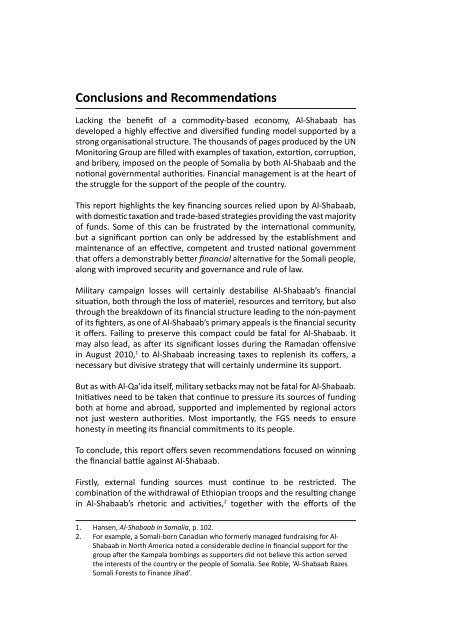You also want an ePaper? Increase the reach of your titles
YUMPU automatically turns print PDFs into web optimized ePapers that Google loves.
Conclusions and Recommendations<br />
Lacking the benefit of a commodity-based economy, Al-Shabaab has<br />
developed a highly effective and diversified funding model supported by a<br />
strong organisational structure. The thousands of pages produced by the UN<br />
Monitoring Group are filled with examples of taxation, extortion, corruption,<br />
and bribery, imposed on the people of Somalia by both Al-Shabaab and the<br />
notional governmental authorities. Financial management is at the heart of<br />
the struggle for the support of the people of the country.<br />
This report highlights the key financing sources relied upon by Al-Shabaab,<br />
with domestic taxation and trade-based strategies providing the vast majority<br />
of funds. Some of this can be frustrated by the international community,<br />
but a significant portion can only be addressed by the establishment and<br />
maintenance of an effective, competent and trusted national government<br />
that offers a demonstrably better financial alternative for the Somali people,<br />
along with improved security and governance and rule of law.<br />
Military campaign losses will certainly destabilise Al-Shabaab’s financial<br />
situation, both through the loss of materiel, resources and territory, but also<br />
through the breakdown of its financial structure leading to the non-payment<br />
of its fighters, as one of Al-Shabaab’s primary appeals is the financial security<br />
it offers. Failing to preserve this compact could be fatal for Al-Shabaab. It<br />
may also lead, as after its significant losses during the Ramadan offensive<br />
in August 2010, 1 to Al-Shabaab increasing taxes to replenish its coffers, a<br />
necessary but divisive strategy that will certainly undermine its support.<br />
But as with Al-Qa’ida itself, military setbacks may not be fatal for Al-Shabaab.<br />
Initiatives need to be taken that continue to pressure its sources of funding<br />
both at home and abroad, supported and implemented by regional actors<br />
not just western authorities. Most importantly, the FGS needs to ensure<br />
honesty in meeting its financial commitments to its people.<br />
To conclude, this report offers seven recommendations focused on winning<br />
the financial battle against Al-Shabaab.<br />
Firstly, external funding sources must continue to be restricted. The<br />
combination of the withdrawal of Ethiopian troops and the resulting change<br />
in Al-Shabaab’s rhetoric and activities, 2 together with the efforts of the<br />
1. Hansen, Al-Shabaab in Somalia, p. 102.<br />
2. For example, a Somali-born Canadian who formerly managed fundraising for Al-<br />
Shabaab in North America noted a considerable decline in financial support for the<br />
group after the Kampala bombings as supporters did not believe this action served<br />
the interests of the country or the people of Somalia. See Roble, ‘Al-Shabaab Razes<br />
Somali Forests to Finance Jihad’.


